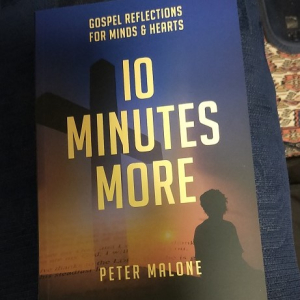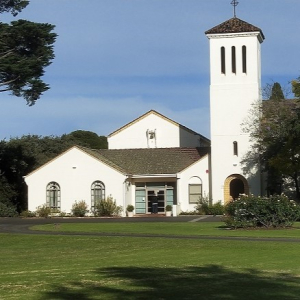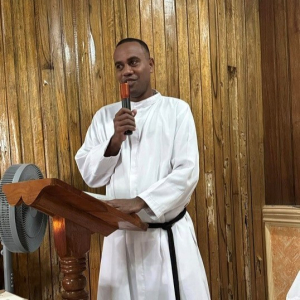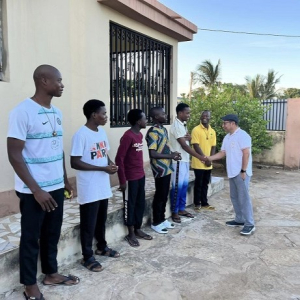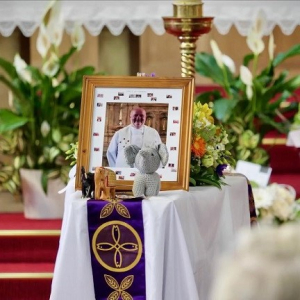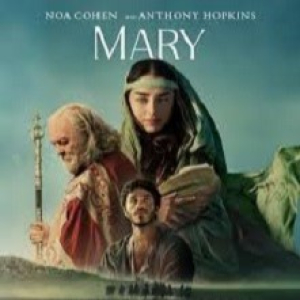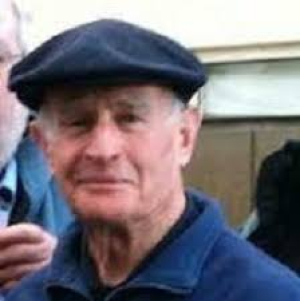Peter MALONE
Rumours

RUMOURS
Canada, 2024. 118 minures, Colour.
Cate Blanchett, Rolando Ravallo, Charles Dance, Nikki Amuka-Bird, Roy Dupuis, Dennis Menochet, Alicia Vikander.
Directed by Evan Johnson, Galen Johnson, Guy Maddin.
Esoteric and exotic are two words that come to mind while watching films by a Canadian rector, Guy Maddin. While he does have narrative and character development, his interest seems to be on the different kinds of impact films can have. His work is praised by critics. But, the average audience is bewildered.
While Rumours is probably the most accessible of his films, it still seems to have bewildered many of the public. To many, this seems so absurd a narrative, that they give up on it.
The basic plot outline, however, seems fairly direct. A meeting of leaders of the G7 takes place in ta castle in a German forest. The seven leaders meet for lunch, served in a pleasant gazebo, discussions, personal interactions, conflicts, and then their being stranded, lost in the forest at night. But, what happens to them in the forest, exposing of the limitations of their characters, the threats of impending apocalyptic doom, certainly takes them and the audience on unexpected paths.
The film does have the advantage of having Cate Blanchett in the central role as the German Chancellor, accented English and all. The other central character is the Canadian, Roy Dupuis, the most complex character of them all and he is given the final rhetorical declarations. The rest of the cast are strong character actors, including Charles Dance, of all people, as the ageing, prone to nod off, American President (and, just as it was a to explain his very proper British accent, he is cut off and we never know). Dennis Menochet dominates his scenes, a large man, -the intellectual, the French president. And Nikki Amuka-Bird, is a black prime minister from the UK.
The film might be seen as a political drama. However, the expose of the limitations of each of the leaders, leads to a satiric approach. The task for the leaders that we watch is their preparing for the communiqué, something like a school project amongst them, small groups, stating the obvious, truisms, platitudes. And then there are many farcical situations, some comedy. And, the three directors have though had an interest in conventions of horror films – so, excavations of 2000-year-old corpses, zombies, sex-obsessed, cavorting in the forest, and an AI program that is a perverse controller, and an overlarge-sized brain out their amongst the trees.
When asked to indicate approach to appreciating Rumours and its satire, a review suggests itself. What if the leaders of the G7, meeting there at the gazebo, all nodded off like the American President and had a communal nightmare. This would be the nightmare, cut off, lost, the very human limitations made all the more manifest, their being manipulated as the world seems to be going to its doom – and, rhetorically, standing there on the balcony, proclaiming some kind of hopeful G7 statement that might transcend the doom. Which means that both the leaders and we ourselves as the audience are often bewildered.
- The work of the directors? Exotic and esoteric? Ironic comedy? Drama? Touches of horror?
- The title, rumours, rumours of war…?
- The basic premise, the meeting of the G7, the world leaders, economic situation, the official statement, reassurance? The screenplay and the presentation of the leaders, strengths, and expose of weaknesses, personal incompetencies, self-importance, relationships, affairs? Their characteristics representing their nations? The meeting, lunch, the gazebo, discussions, the small groups, preparation of the statement?
- The German setting, the forest, the Castle, the gazebo, the forest? The events in the night, the darkness? The trees, the zombie-like creatures, the excavation of the bodies, Sylvain falling in, the sexual behaviour of the zombies, the ferry, the crossing of the water? The final scenes in this castle? The musical score?
- The German leader, memories of Angela Merkel, Cate Blanchet, the accent, in charge, hosting, her concerns, the attraction to Maxine, going to search for him, the sexual encounter, the aftermath? Her support, guidance? The encounter with Celestine, her being able to understand and translate?
- Maxime, Canada, the crises at home, the past affair with the British Prime Minister, his Celestine, the present with the German, his personality, his wife, deceptions? His crises and running away, the drinking, the clash with the British Prime Minister, the sexual encounter with the German leader, wandering in the forest, the discovery of the giant brain, discovering Celestine, the interactions with her? His carrying Sylvain after his collapse?
- The French Prime Minister, pomposity, large, history, his book on graves, the excavations, his literary quotes, historical quotes, relationship with the other members, especially with the Italian Prime Minister, his notes blowing away, his pursuing them, in the forest, falling into the grave, the struggle with the body, his collapse, Maxine carrying him, the wheelbarrow, the ferry?
- The Japanese Prime Minister, quiet, participating in the activities?
- The Italian Prime Minister, small, friendly, quiet, the cured meat in his pocket, helping everyone, is a special concern about the French Prime Minister, the wheelbarrow?
- The British Prime Minister, black, businesslike, the past relationship with Maxime, f ending him off, the participation in the activities?
- The American president, as played by Charles Dance, the British accent, the almost explanation but not given? Age, superiority, leader of the free world, yet his falling asleep, his wanting to sleep, the Italian Prime Minister saving him?
- The satire, the discussions for the statement, like small school groups discussing, the obvious, the platitudes…? The expose of the foibles? Lost in the forest, the zombies, the crises?
- Celestine, the past, the talk about a new world order, her language, her documents, past with Maxime, the translation, rescuing her? Talk about Astrid?
- The phone, the messages, Astrid, the little girl, asking for rescue, the group making their way to the Castle, entry, finding the Pres, the AI control, the accusations of sexual abuse, manipulation of characters? The death of the president?
- The finale, the world up in flames, the rhetorical speech, the seven on the balcony? How much satiric? How much some kind of hope despite everything?
How to Make Gravy
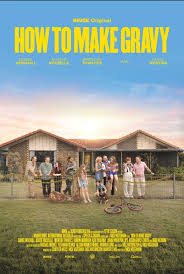
HOW TO MAKE GRAVY
Australia, 2024, 120 minutes, Colour.
Daniel Henshall, Hugo Weaving, Agathe Rousselle, Brenton Thwaites, Damon Herriman, Kate Mulvaney, Benedict Hardie, Fayssal Bazzi, Kieran Darcy-Smith, Kim Gyngell, Jonah Wren Phillips, Adam Briggs.
Directed by Nick Waterman.
Paul Kelly has been a musical icon in Australia for decades, singer and performer, composer, strong songs and lyrics. This film is based on his Christmas song, How to make Gravy, 1996 (the lyrics can be found by Googling). Producer, Meg Washington and her partner, director, Nick Waterman, have elaborated on the characters and situations in the song, creating a narrative – and introducing a most sympathetic character, not in the song, the prisoner, Noel.
The film has a Queensland setting, an extended family gathering for Christmas, the background of grief with the central character, Joe (Daniel Henshall) grieving the death of his mother. There is his wife, Rita (French actress Agatha Rousselle), his young son Angus (Jonah Wren Phillips) young daughters. For the Christmas dinner, his sister and brother, uncles, some of the guests are initially jovial, the grief surfacing, Joe highly aggressive towards his brother-in-law, a fight, the police, in prison.
In prison, Joe is victimised by a fellow prisoner, have Red, and other bullying prisoners. Joe has no anger management and fights back, to his detriment. His wife visiting, his son would like to visit, he has phone calls, but the families not sure how he is bearing up in prison.
Where the original song narrative is enhanced is the introduction of a most sympathetic life-sentence prisoner, Noel (Christmas name and ultimately his wearing the Santa Claus hat), a sympathetically vigorous performance from Hugo Weaving. Noel is charge of the prison kitchen, offers Joe a job, Joe offering his family’s recipe for making gravy. There are some jovial and joyful scenes in the kitchen, the cooking, and, eventually, the chaplain providing some wine for the gravy recipe.
Echoing Paul Kelly’s Catholic background, there is a young chaplain, not many in his congregation, a bit desperate. And there is a prisoners’ choir who perform with zest.
In the meantime, the screenplay offers the difficulties at home, Angus and his tensions, his musician uncle trying to help out at home (Brenton Thwaites), Joe in an angry outbur but provoked st being prevented from seeing his wife and son at Christmas.
How does the film bring everything to a climax – Angus angry with his mother and uncle, running away, going to the prison – but a kindly guard allowing Angus in and a happy reconciliation with his father. And the kindly Noel effecting some peace in the prison.
A film for Australian audiences to enjoy – with the hope that others will enjoy it as well.
- Paul Kelly’s song, popular, Christmas, prison, family? A dramatisation of the song?
- The Queensland setting, the town, home for Christmas, the prison, exteriors, interiors, the kitchen, the yard and fights? The musical score, the range of songs, music and lyrics?
- The Christmas theme, the first Christmas, 51 weeks later? Introduction to Joe, lying on his bed, Angus urging him awake, preparing for Christmas, the grief at the death of his mother, his relationship with his wife, daughters? The guests arriving for Christmas, the uncles, his sister and Roger, Dan, the separation, his daughter?
- The tension at the table, the speeches, the conversation, aftermath, family tensions, criticisms, squabbles, Joe and his aggression, Roger, the fight, the calling of the police?
- Joe in jail, his angers, his grief, the visits from his wife and their talking, his son wanting to visit, the phone calls? The routines of the prison, Joe being picked on, Red his associates, the violence, Joe as victim? The other prisoners, life in the prison?
- Noel, his Christmas name, Hugo Weaving’s presence, in jail for life, yet his attitudes, offering to help Joe, offering him the job in the kitchen, Joe and his return, the rules, the attendance at the meetings, the significance of the meeting, Joe telling his story, the response of the men? Joe and the recipe for gravy, the ingredients, no wine? The bonding with the men in the kitchen, the preparation of the meals? The preparation for Christmas, the detail? Joe at home in the kitchen, going to the concert, looking forward to Angus’s visit? Red picking on him, the fight, his being prevented from seeing his son?
- The men in the kitchen, the choir practices, the priest, talking with the men, the concert, the sermon, his drinking the wine, his bringing the wine as a gift for the gravy? Noel’s intervention?
- Rita and the children at home, Dan moving in, helping, the girls coping, the pressure on Rita, her love for Joe, her mother’s phone calls, her choices? Dan and his support? The dancing, Angus’s anger? Going to see Joe with Angus, his not being allowed the visit?
- Dan, his daughter, the woman across the street, her bullying sons picking on Angus, the fight? Her chatting with Dan, the sexual encounter? And having to come to terms with himself and Mary? Her saying she had forgiven him?
- Stella, with Roger, the visit to Joe, the tensions with Roger, the bouquet, his presence at the meal, the only one at home during the search, talking with John on the phone, the apology? Stella and the future with him, saying her choice was family or Roger?
- Angus, the upset, seeing his mother in Dan, running away, the search, the desperation? The bike, the dog and the bus, Paul Kelly as the driver, going to the prison, the sympathetic guard and surveillance, letting Angus in, keeping the dog? Bringing Joe to the visiting room, revealing Angus, the embrace?
- Joe and his final confrontation with Red, standing up to him and his bullying? Noel making him to go to the concert? Getting the meal, some kind of peace?
- The Christmas ending, family reconciliations, hope for the future?
Gladiator II
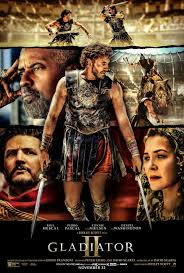
GLADIATOR II
US, 2024, 148 minutes, Colour.
Paul Mescal, Denzel Washington, Pedro Pascal, Connie Neilson, Joseph Quinn, Fred Hechinger, Lior Raz, Derek Jacobi, Matt Lucas, Tim McInerny.
Directed by Ridley Scott.
While sequels are often welcomed by an audience, they also often find it difficult to maintain the standard of the original film. Which is the case here. Gladiator won the Oscar for Best Picture in 2000 as well as an Oscar for Russell Crowe in his role as the strong Roman warrior, Maximus. She is one was a triumph for prolific director, Ridley Scott.
It was something of a surprise when plans were made over 20 years later for this sequel. The focus is on the son of Maximus who died in the first film, his son with Lucilla, the daughter of Marcus Aurelius. He is Lucius, played by Paul Mescal, seen first quietly living in North Africa, the Romans attacking under the leadership of General Acacius, Pedro Pascal, the North Africans defeated, taken to Rome, sold as slaves, many commandeered as gladiators.
Audiences will see the parallel scenario with the original film, the provinces, Roman warfare, prisoners, slavery, the Colosseum, gladiators, harsh life, brutality in the arena, political intrigue.
As with the original film, Gladiator II looks quite spectacular, special effects, naval battle sequences, extraordinary fights in the Colosseum especially against monstrous effect monster monkeys, and the recreation of a battle sequence in the Colosseum. Many of these scenes are very violent, and some of them exceedingly brutal in the impact. Sometimes we might wonder, as we watch the brutality of the fights and audience excitement that we are very much like these vicious Romans and their control of human life with thumbs down.
As with the Emperor, Commodus in the original film, there are two rather despicable emperors this time, the twins Geta and Caracalla (Joseph Quinn and Fred Hechinger) as symbols of the decline of the Roman Empire. Returning from the original film is Connie Neilson as Lucilla, daughter of Marcus Aurelius, mother of Lucius, recognising him, trying to make contact, eventually sacrificing herself for him. She is also in a relationship with General Acacius. One of the difficulties for the impact of the drama is that while Paul Mescal is exceedingly serious and single-minded as Lucius, he is not charismatically engaging for the audience a little in here and charm, while Pedro Pascal as Acacius does have leadership charism.
But, the big difference for this drama is the presence of Denzel Washington as the former slave with political and power ambitions, based on an actual character, Macrinus, a master in buying slaves, controlling the gladiators, with entree to the Emperor’s, deals with corrupt senators, waiting for his power grab moments, unscrupulous with his violence, even with the Emperors.
Given the limitations, the repetitions in parallels with the original, and the single-minded sternness of Paul Mescal as Lucius, audiences who enjoy Roman epics, will enjoy Gladiator II as well.
- The impact of the original film? Its legacy? So many years for a sequel? The continuity? The scenario of the first parallel scenario of the sequel?
- The work of Ridley Scott, epics? And audience response?
- The settings, North Africa, the city, the battles, the Navy, the Roman conquest? The road to Rome? The entry? The Colosseum, the quarters for the gladiators? The animals? The use of the Colosseum, fights, naval battles? The royal palace? Homes? The market for gladiators? The musical score?
- The links with the original, the mentions of Maximus, the flashbacks and the appearance of Russell Crowe? Connie Neilson as Lucilla, her relationship with Maximus, with, discovering with Lucius? Derek Jacoby as the senator?
- Africa, Lucius and his life there, relationship with his wife, warrior, silent about his identity, the local authorities, the attack of the Romans, the details of the battles, strategies, defeat? Imprisonment? The death of his wife, seeing her pass into the next life, grief?
- The prisoners going to Rome, the entrance to the city, the legions and the triumphant entry, general Acacius, his relationship to Lucilla, his tribute to the Senate, their suspicions, their wanting him to go on further conquests? His own response, with Lucilla, his significance in the revolt against Rome, his legions at Ostia, the sending of the message, his being trapped, sparing Lucius, his own death? Lucilla’s grief?
- The role of Macrinus, dented Washington’s presence, slave, freed, ambitions for the Senate, ruling Rome? The auctions of slaves, seeing Lucy is in action, his talents, strength, perseverance, purchase? His master of slaves and the treatment of the slaves? The training, the accommodation in the below the Colosseum? The fight in the Colosseum, the monstrous monkeys and battles, UCS and his survival? The response of the crowds, the emperors, thumbs up?
- The personality of Lucy is, silent about his identity, his anonymity in Africa, his relationship, the defeat, the death of his wife? With the other slaves? With the master of slaves, his being tested? With Macrinus? With Lucilla, her visit, his identity, his resistance? His eventually changing, the encounter with Acacius, the fight in the arena, spared, acacias death?
- The background of the emperors, their status, twins, effete life, games, the court, the worms? The attitude of the Senators? Acacius? Macrinus and his setting them up, the death of Geta?
- Arrow colour, wilfulness, childish, nominating his monkey as senator?
- Lucius, behind-the-scenes, the ex gladiator, observing, supportive Lucius, his sending him to Ostia to bring the troops?
- The buildup, the taking of Lucilla, in the arena, her death, the many troops converging on Lucius?
- The troops arrival, Macrinus and his control, his deals with the senators, the corrupt senator, the gambling, the meeting of the senators, Gracchus and the past, and government, decline? The death of Gracchus?
- The troops arriving, Lucius and his a leadership, the confrontation with Macrinus? And the future?
New book of Scripture and Prayer Reflections, 10 Minutes More, Peter Malone MSC
New book of Scripture and Prayer Reflections, 10 Minutes More, Peter Malone MSC
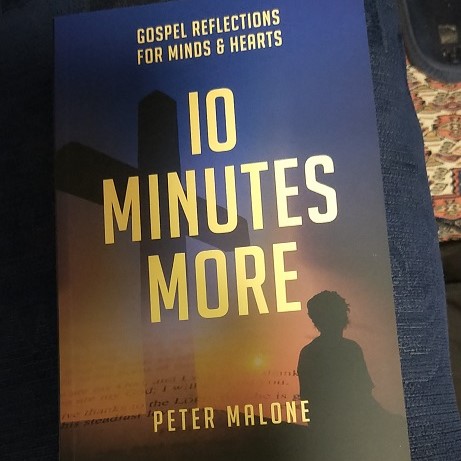
10 Minutes More is the sequel to the author’s previous book 10 Minutes. As in the first volume, we are again invited to take 10 minutes to read a chapter in the book. The chapter will introduce a Bible story that will lead to another 10 minutes of reflection, prayer and sharing.
It is an approach that reflects the storytelling that was at the heart of the life and ministry of Jesus himself who not only told stories but whose entire life, from birth to death, became story. His stories, his parables, all display how he shares every aspect of life with us – joys, sorrows, pain, suffering.
10 Minutes More belongs within that Jesus tradition. By reflecting – even for a few minutes – on a gospel story, we connect its profound message with our own lives. We allow its teaching to help us make sense and purpose of our own life journeys in the ancient witness of the gospel.
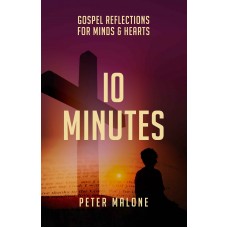
10 Minutes More is another delightful book from the pen of Fr Peter Malone MSC. It continues in the style of the earlier book, 10 Minutes. These small books are created for short and focused reflections on Jesus. The simple style belies a lifetime of scholarship and reflection on the Gospel accounts of Jesus; and Peter offers accessible insights into our favourite stories and connections to the great hero narratives of the Hebrew scriptures.
– Alison McKenzie, Secretary General of the Laity of the Chevalier Family.
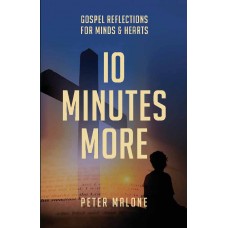
Peter Malone’s previous book 10 Minutes, Gospel Reflections for Minds and Hearts is a very valuable book for promoting discussion on many biblical events. Now he has written a new series of these Gospel reflections, 10 Minutes More. I can strongly recommend it for both private reading and group discussion.
– Paul Castley MSC, author, A Time for Hope (Coventry Press)
The first Gifted and Blessed Province retreat – 4 more to come
The first Gifted and Blessed Province retreat – 4 more to come
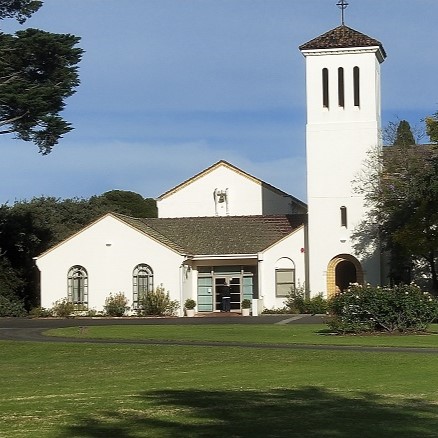
Photos, thanks to Kimi and Peter Hendriks
A beautiful sunny, pleasantly warm week at the Holy Name Retreat Centre, Anglican Sisters, at Cheltenham, in the middle of Melbourne suburbia, but beautiful parklike grounds for silence, reflection and walking. (The top temperature for Monday, the day after our retreat, is predicted as 41!)
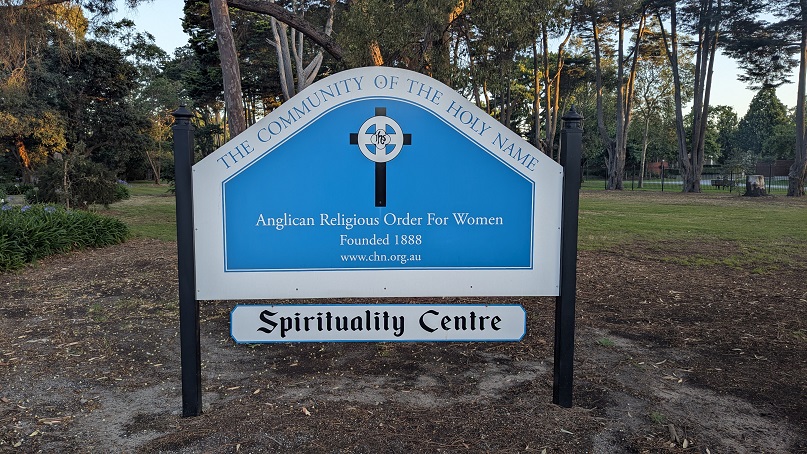
Chris Chaplin led the directing and facilitating team, Krish Mathavan and Peter Hendriks, fine reflections and questions, time for ever-deepening group sharing, time and space for each of us and a quietly moving Eucharist each afternoon.
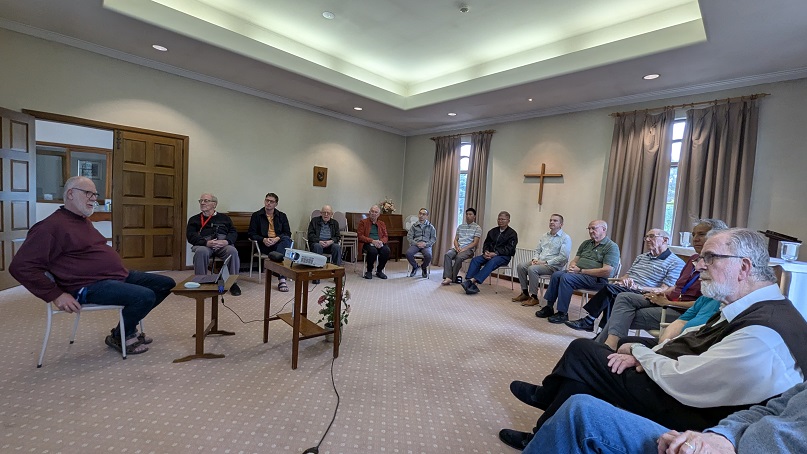
A wonderful opportunity for a communal MSC retreat, remembering the graces of our lives and moving with hope to the future, our Heart Spirituality and our self-giving in mission.
Krish
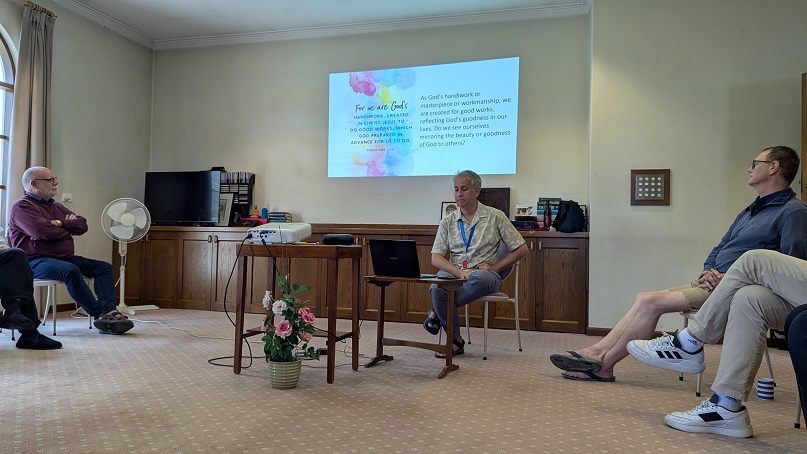
Peter
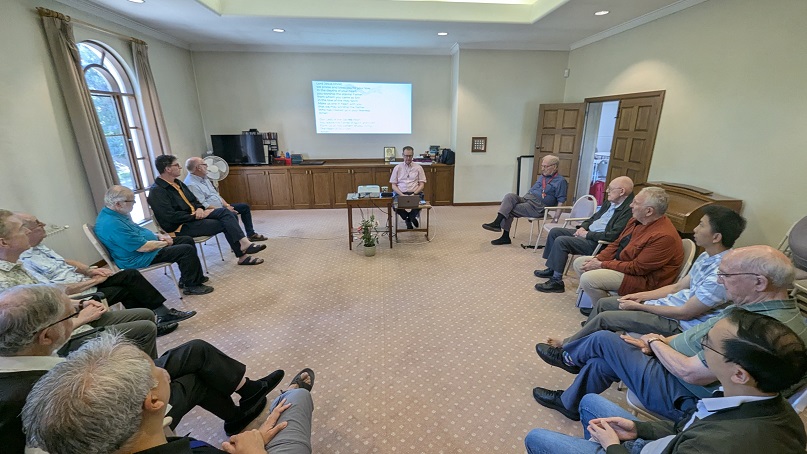
There were 16 of us, Ted McCormack at 91 the senior, Khoi Nguyen at 38 the youngest, 53 years between them. Then we were four in our 80s, 3 in our 70s, 3 in our 60s, 4 in our 40s. (Age checking if you wish from the group photo, though Peter Huan was missing for the photo.) Peter brought his Vietnamese heritage (and longtime NT experience) as did Khoi and, from Vietnam, Danh (who spent 2020 on the Tiwi Islands and 2021 in the Siloam Spiritual Direction program at Heart of Life).
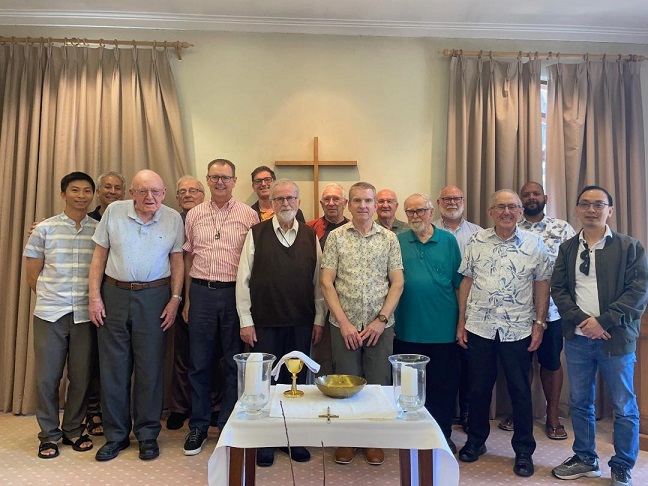
We wish all well for the forthcoming retreats, starting at Kensington on Wednesday 18th, that they will be Gifted and Blessed.
Pacific Islands Province, Professions and Foundation Day.
Pacific Islands Province, Professions and Foundation Day.
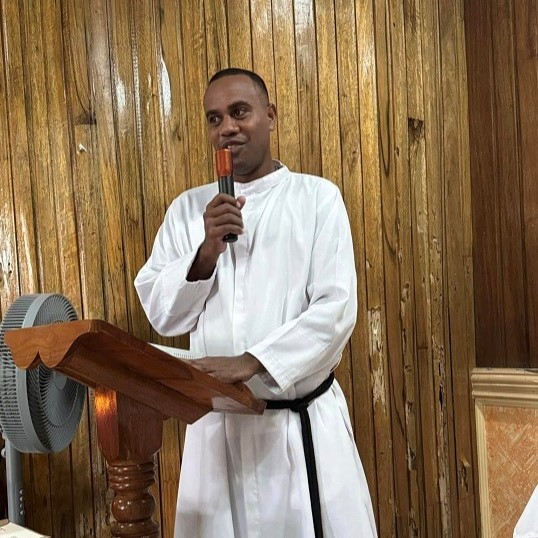
Today, Bro. Tadeo Camaitoga, MSC renewed his religious profession as a Missionary of the Sacred Heart of Jesus.
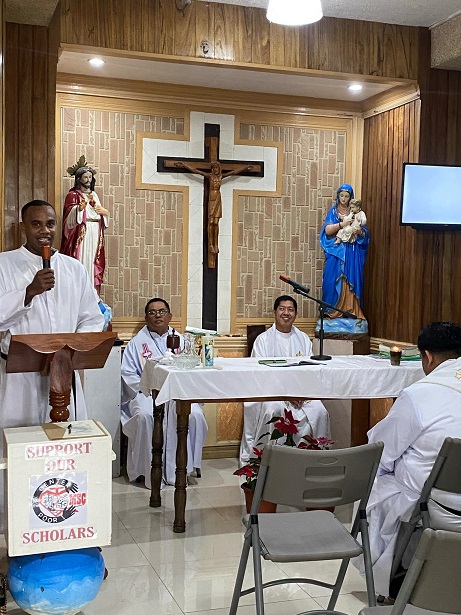
Bro Tadeo is a member of MSC Pacific Islands Province. He is in the Philipines for pastoral exposure at the MSC Cepagco and MSC Center for the Poor.
Celebrating double blessings today! On this special day, we honour the founding of the MSC Congregation and rejoice in the first profession of our devoted young MSCs.

Br. Bwari msc Kiribati, Br. Toatoa msc Kiribati
Br. Saulima msc Futuna, Br. Apiliato msc Futuna

And an Australian Province connection, these four men were directed by Dominic Gleeson this year in the 30 Day Retreat.
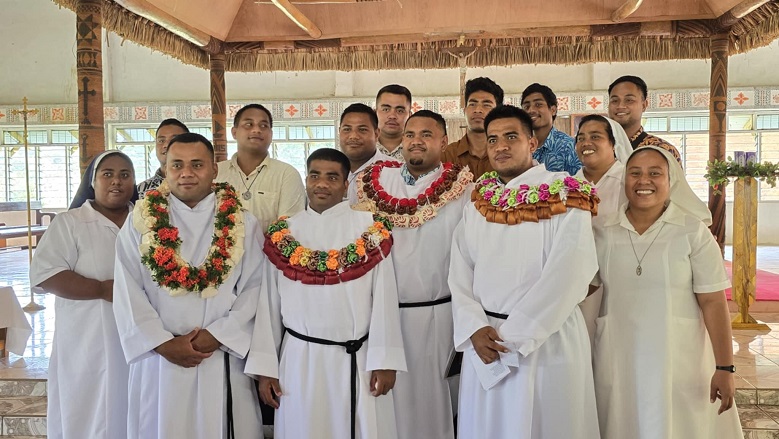
Celebrating 170 years of MSC spirit – part 2 of Abzalon’s letter
Celebrating 170 years of MSC spirit – part 2 of Abzalon’s letter
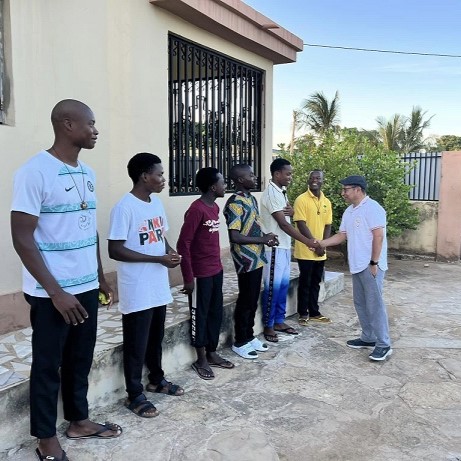
Mozambique
With great hope, we can say that we have 1560 reasons to celebrate these 170 years – the approximate number of MSC confreres worldwide.
For us MSC, there should be no room for discouragement, even though we live in a world beset by so many challenges, the war in Gaza, Lebanon, Syria, Yemen, Ukraine, the eastern Congo, Sudan, among others. The problems of Safeguarding in the Church and in our Congregation. The ecological devastation of Mother Earth.
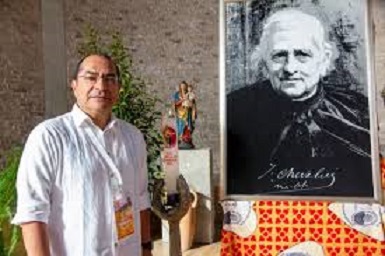
As I write this letter, I have received challenging news from two MSC places. Our two confreres in Mozambique have informed me that the situation of protests and police repression has reached the city of Pemba, where they live and work. They had to go immediately to pick up the formandi from the school where they study in order to get them to safety in Jules Chevalier House. Our confreres in South Korea informed us that a grave situation emerged in the political leadership of this beautiful and developed country; martial law was imposed and revoked. This has led to protests calls for impeachment, generating a situation of terrible chaos where the People of God are affected.

Korea
In Haiti, Nicaragua, Venezuela, and Northern Cameroun, our confreres also face complex situations. These are just a few of the many examples we could give of challenging situations in which we are celebrating today, 170 years of missionary and prophetic self-giving and dedication amid challenging, complex, and, unfortunately, "eternal" conflicts.
This year I had the grace and opportunity to spend nine weeks in our largest Province, Indonesia. Listening personally and communally to the vast majority of members made me witness the MSC charism alive, resilient, vibrant, vulnerable, and committed in approximately 75 parishes and other ministries. In the vast areas of West Papua, I witnessed the presence of young confreres dedicating their lives to the People of God in parishes in the jungle and facing the overwhelming presence of companies that extract and exploit natural resources.
I have personally witnessed a new organisational awakening in Papua New Guinea, our first mission, with its provincial structures and mission work. We also received news of the progress in the process towards the canonisation of Peter To Rot.
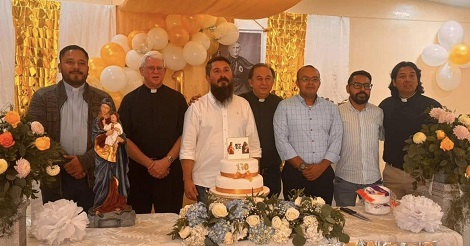
US/ Colombia
The members of the General Team have also been able to hear the reality of our confreres in many parts of the world. For example, the United States Province is a multicultural, vibrant province, which has to address the missionary imperative of rethinking and reconfiguring itself in order to face a new and less certain future.
How inspiring is our presence in Japan. While the church has small numbers of parishioners, and in a country not known for demonstrative expressions of love, the people know they are loved because of the faithful dedication of our confreres. One older man told an MSC that he knew the MSC love them because even though only a few people came to Sunday Mass, the MSC continued to turn up and be there for them.

Terry Bowman MSC, Mass and Burial
Terry Bowman MSC, Mass and Burial
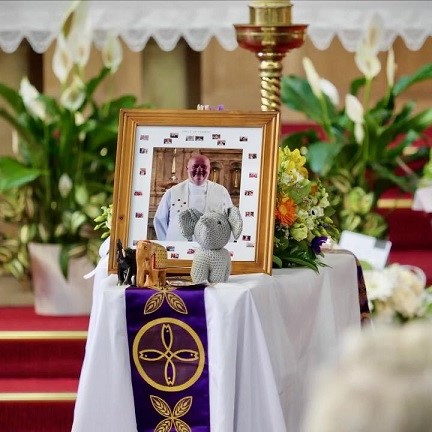
With thanks to Bob Irwin for text, John Walker for photos.
In the early afternoon of Sunday 24th of November 2024, our beloved Terry Bowman MSC went for a walk, or as the author of the book of Genesis would put it (chapter 5): Terry went for a walk with his God and he NEVER CAME BACK. God suddenly took him from us.
Ahh, Terry, we miss you terribly. Whilst our faith reminds us that you are fine, you are with your loving God, but we here, who are still on our journeys, sad; some still weep, some still in shock. You have gone too soon.
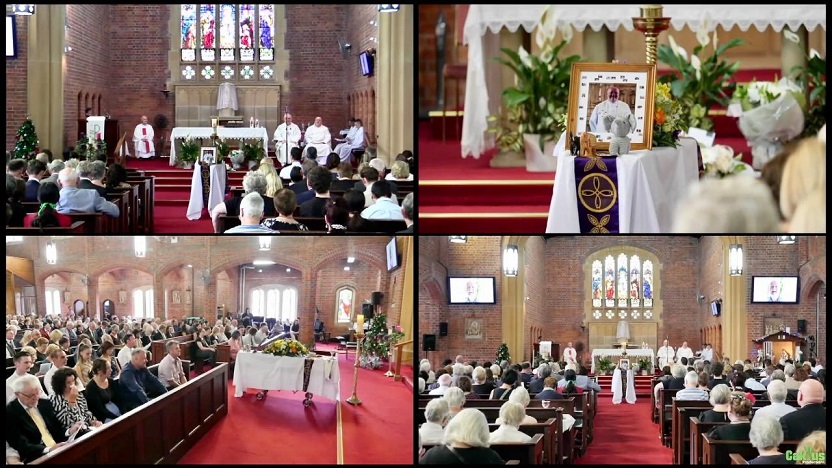
The book of Ecclesiastes, as read by Gerard, reminds us that there is a time to hurt, a time to weep, a time to mourn, but there is also a time to heal, a time to laugh, a time to dance, and as Terry might say, a time to SING.
We best honour Terry today by praying in a spirit of great gratitude for his loving presence amongst us, ever joyful, kindly, full of fun, and compassionate. Today, whilst we might feel sad for ourselves and our boss, we are here to celebrate and give thanks to God for Terry… AND THANKS TO TERRY FOR ALL THE HAS BEEN FOR US. He would prefer that, I think!
The sharing of memories last night and the eulogy of Paul and Gerard this morning told us so much about Terry and gave us insight into why he is loved so much, what a loving pastor he has been to so many people.

So let me just try to summarise something of the man with a few words, namely: Terry Bowman, a lover of life, a lover of people, a lover of God and His Church.
Living with Terry in the Coogee Presbytery for six years, is one of the delights of my life, as I enjoyed his good humour, his somewhat naughty wit, his cooking, his ducking down to what he called his other home, the Coogee Bay Pub Tab, his constant concern for the people of the parish, the school, the MSC family, and his many friends and his wonderful extended family.
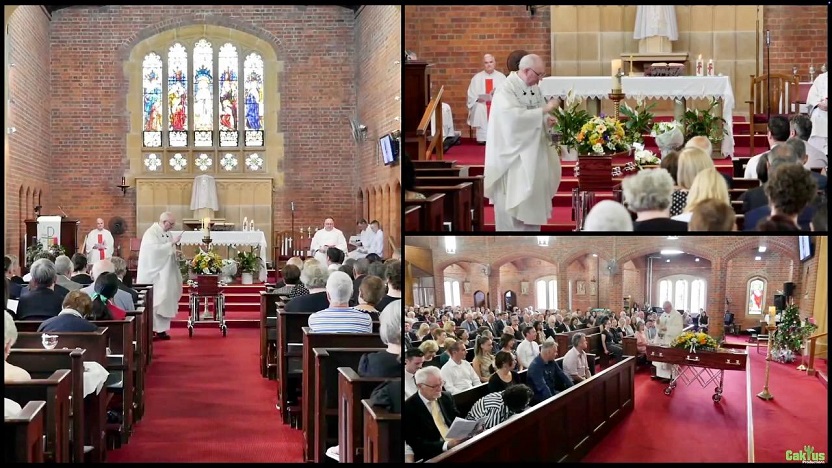
MSC
Terry was not just a good man with a big voice and joyful approach to life, with a heart bigger than his body, but he was also a man who vowed his life to be a Missionary of the Sacred Heart. We know from his story that he served in MSC parishes in South Australia, the Northern Territory, Tasmania, Victoria, and New South Wales.
It is easy to do a quick checklist concerning what should be the spirit of an MSC parish would operate. It should have the spirit of a loving family. Our MSC rule of life, our Constitutions, in number 32 we read the qualities needed… let me list some of them and you will see how Terry embodied those qualities: KINDNESS; UNDERSTANDING; COMPASSION; MUTUAL FORGIVENESS, GENTLENESS; HUMILITY; HOSPITALITY; AND A SENSE OF HUMOUR.
Humility? Yes, he could steal the show, if you let him! But today, it is all about you, Tessa!
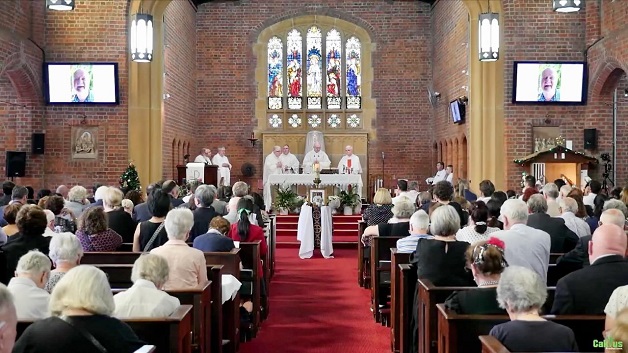
THE PRIEST
As a priest and pastor, Terry brought more people into the Church than we could ever know.
He had wanted to be a priest from an early age and eventually after studying at the Late Vocations Seminary just up there on the hill behind the Monastery, he was ordained in 1988.
Many years ago, when I was discussing with a parish council about what kind of priest they needed in their parish, the reply was simple: send us someone who is KIND; that is the quality we most need.
Terry had kindness in spades. His ability to love so strongly was based on his surety that he was unconditionally loved by God, and that means that all people are loved the same way, and he was there to remind us of that, as best he could, in what he said, and in how he treated us.
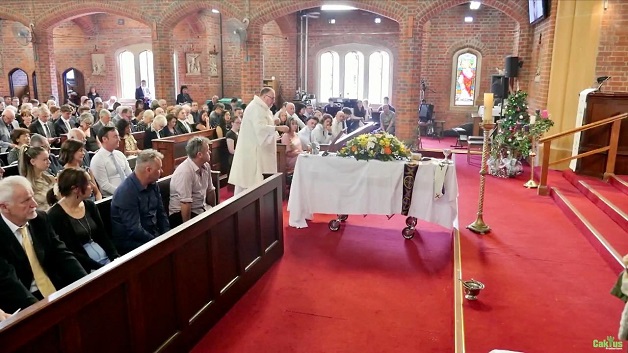
A large part of his attractiveness and effectiveness was that it was so obviously "one of us". He had his own weaknesses and fears and anxieties, and demons, as those who knew him well could attest, but he approached life positively, with a song, with charm, and kindness.
As a priest at Mass and in the pulpit, he inspired, not with any pomposity but with a genuineness in his words, his prayers, his preaching and his singing.
He cared for young and old, the sick and dying and the brides and grooms and the newborn and all in between… with good humour and the love of the Good Shepherd.
He loved to celebrate all the Sacraments and he led them in his own inimitable and attractive way.
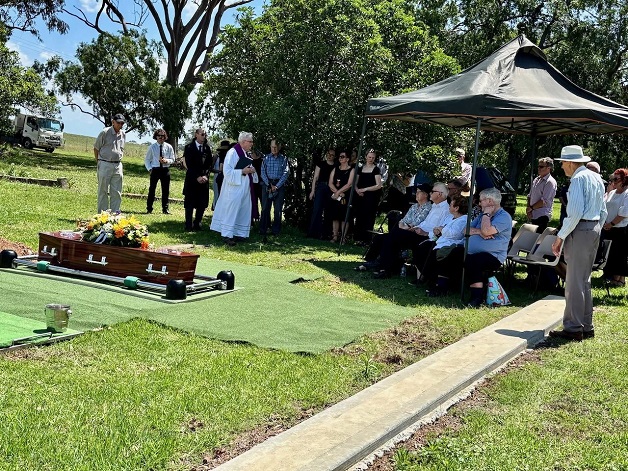
AND NOW: WHAT OF US
It is very obvious that Terry's life was not wasted! Scripture reminds us that "the life and death of each of us has its influence on others" (Romans).
… And as Shaz read in the second reading… "May his good deeds go with him”. Might I suggest that we make sure that his death is not wasted on us, either. Let us, as the people of God, be truly grateful to God and Terry for all that we have received.
If Terry’s overcoming difficulties and staying positive touches us…, we should do the same. Whatever it is we most admire in Terry, let it become a bigger part of how we live our lives. Jesus reminds us today in the Gospel to go to him, "all you who are labour and overburdened, and I will give you rest, for my yoke is easy and my burden is light.
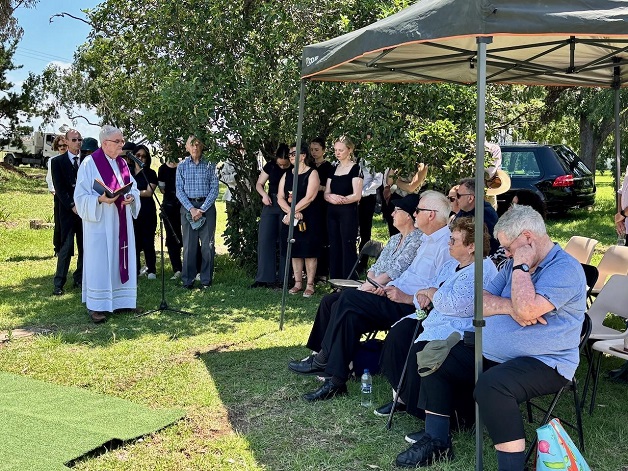
Let us, like Terry, grow closer each day to Jesus, so that we can live life with joy and song, no matter the problems we must cope with.
Thanks again, Terry. Your life and death are definitely not wasted on us.
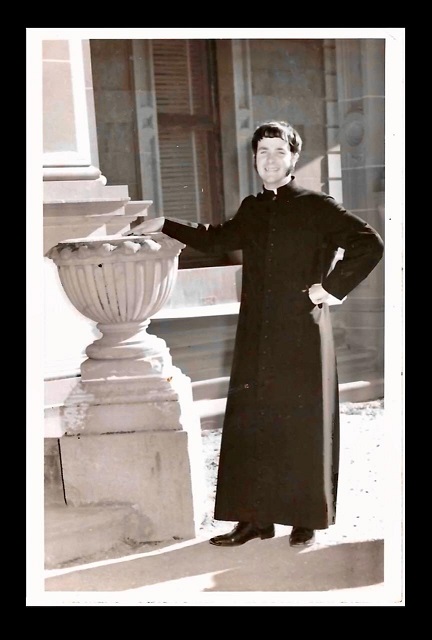
Mary, new biblical film, Netflix
Mary, new biblical film, Netflix
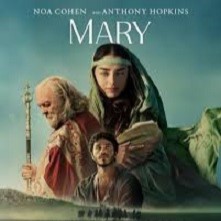
Many Catholics were looking forward to this film. Here is a review and and the suggestion for an online assessment by Fr Edward Looney, Green Bay diocese, theologian and Marian scholar. Link at the end of this review.
Noa Cohen is Mary, Anthony Hopkins is Herod.
Almost immediately, Mary looks straight to camera telling us to trust her, that we do not know her story at all. And, by the end of the film, we realise that, apart from the key Gospel scenes of the infancy narratives, just how much inventiveness there is in this storytelling. It is the work of screenwriter, Timothy Michael Hayes who is credited in the Internet Movie Database note, as responsible for “inventive biopics”. This is certainly the case here (and we might agree with the familiar declaration during the final credits that, while based on actual characters, characters and events have been reworked for dramatic purposes.
It was only in the second and third centuries that Christians wanted to know more about the biblical characters, creating alternative narratives, different Gospels, giving names to characters who are not even mentioned in the Gospels, especially Mary’s parents, Joachim and Anne. The screenwriter has drawn on some of these apocryphal Gospels, especially the proto-evangelion of James, as well as the visions of mystics like Maria of Agreda and Anne Catherine Emmerich, the latter one of the inspirations for Mel Gibson’s The Passion of the Christ.
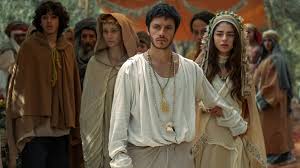
With the focus on the young Mary, her elderly parents praying for a child, their dedicating her to the temple, Mary as a young student at the temple, the encounter with Joseph…the film might well be described as a Young Adult interpretation of Mary aimed at the young adult audience. But, while the film might have been open to younger children’s audiences but the Mary stories interwoven with the dramatic history of Herod the Great, played by Anthony Hopkins in his mid-80s like a King Lear gone wrong, with some very bloodthirsty sequences, his torture of the High Priest, and the expected massacre of the innocents.
Filmed in Morocco, one of the difficulties is that the film’s sense of geography, Nazareth in Galilee, Jerusalem in the south, Bethlehem near Jerusalem, is rather skewiff, especially the closeness here of Nazareth to Jerusalem.
The screenplay also draws on some familiar Gospel themes and applying them these characters, Joachim fasting for 40 days and 40 nights in the desert, the visitation with Mary and Elizabeth, Mary under suspicion for her pregnancy and the possibility for her being stoned…
One of the difficulties of the screenplay is the frequent appearance of Gabriel, always in blue, sinister rather than angelic and also Satan with taunts and temptations for Mary. Which means then that Mary as the mother of the Messiah seems to be fairly common knowledge not only for her family, but for the high priest, for Herod, and for the people, the knowledge of the bright star signalling Jesus birth. Not exactly the Gospel perspective on the gradual awareness of Jesus and his mission.
One Gospel character does get some welcome attention, the prophetess Anna in the Temple, friend and protector of Mary (a credible and welcome interpretation of her role), with a frail Simeon coming in with his words to Mary of the sword piercing her heart.
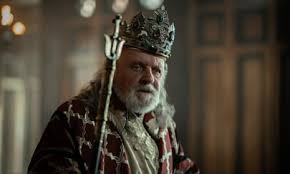
There will be a variety of responses to this film, biblical scholars probably not enthusiastic at all, ordinary viewers, not familiar with Gospel details and literary forms, enjoying it at the Young Adult level mixed with swords and sandals atmosphere.
Peter Malone MSC
American priest, from Green Bay diocese, Edward Looney, theologian with an emphasis on Marian studies, was invited to write almost immediately an analysis of the screenplay for Crisis Magazine, relating it to the Gospels, and noting the influences of the early alternate Gospels and the visions of the mystics. It is well worth Googling:
https://crisismagazine.com/opinion/the-unrecognizable-netflix-mary
Acknowledging Terry Herbert MSC, 85
Acknowledging Terry Herbert MSC, 85
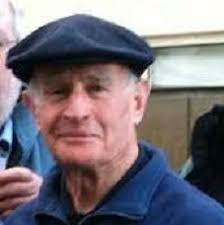
Terry celebrated his 85th birthday at Kensington on December 4th.
Bowral. Terry has spent a great deal of his lie growing up there, education with the OLSH Sisters at St Thomas Aquinas, at Chevalier as a student, at Chevalier on the staff (for 38 years).

Terry's other lifelong vocation: the weather
He made his profession on February 26th 1963, studied at Canberra Monastery, pastoral work and then joined the first group of students at St Paul’s National Seminary, the group, including Arthur Stidwill MSC, Len Helm MSC, Laurie Bayliss MSC and Ed Travers MSC, August 21st 1971.
Along with the years on the staff at Chevalier, he also spent 7 years at Monivae and short times in Randwick and Henley Beach parishes.
It would be remiss not to mention the weather – Terry’s hobby while still at school, working for the weather bureau, and a lifelong devotion… Though the photo is not of Terry in action, it is a tribute to his other talent for decades on his bike.

Terry was part of the Chevalier 1956 Leaving Certificate class four joining the MSC, with Doug Smith, Tony Arthur and Peter Malone
